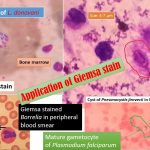Blog
Giemsa Stain: Introduction, Preparation, Principle, Procedure and Result Interpretation
 Introduction of Giemsa stain Giemsa stain comes under a type of Romanowsky stain. The name of this stain has come from the surname of a German chemist Gustav Giemsa, who created a dye solution. It was initially designed for the detection of malarial parasites in blood smears, but it is also used in histology for routine examination of blood smears. This technique uses for the demonstration of other than malarial parasites, microorganisms like Helicobacter pylori, [embed]https://www.youtube.com/watch?v=0xMXqa6lp2w[/embed] Chlamydia...
Introduction of Giemsa stain Giemsa stain comes under a type of Romanowsky stain. The name of this stain has come from the surname of a German chemist Gustav Giemsa, who created a dye solution. It was initially designed for the detection of malarial parasites in blood smears, but it is also used in histology for routine examination of blood smears. This technique uses for the demonstration of other than malarial parasites, microorganisms like Helicobacter pylori, [embed]https://www.youtube.com/watch?v=0xMXqa6lp2w[/embed] Chlamydia...
Salmonella: Introduction, Pathogenesis, Lab Diagnosis and treatment
 History of Salmonella Salmonella Typhi is also known as Eberth-Gaffkey or Eberth Typhi. Eberth (1880) observed Salmonella into the mesenteric lymph node and spleen of typhoid patients. Gaffney isolated this organism in 1884. Introduction of Salmonella Family: Enterobacteriaceae Gram-negative bacilli, non-sporing, non-encapsulated, aerobic or facultative anaerobes, 2 to 4 × 0.6 µm, most strains are motile except Salmonella gallinarum and pullorum. [embed]https://www.youtube.com/watch?v=aMD8DZGM8fw[/embed] Salmonella Typhi and Paratyphi Morphology 2 to 3 µm Χ 0.6 µm Gram-negative bacilli Motile due to peritrichous flagella Non-...
History of Salmonella Salmonella Typhi is also known as Eberth-Gaffkey or Eberth Typhi. Eberth (1880) observed Salmonella into the mesenteric lymph node and spleen of typhoid patients. Gaffney isolated this organism in 1884. Introduction of Salmonella Family: Enterobacteriaceae Gram-negative bacilli, non-sporing, non-encapsulated, aerobic or facultative anaerobes, 2 to 4 × 0.6 µm, most strains are motile except Salmonella gallinarum and pullorum. [embed]https://www.youtube.com/watch?v=aMD8DZGM8fw[/embed] Salmonella Typhi and Paratyphi Morphology 2 to 3 µm Χ 0.6 µm Gram-negative bacilli Motile due to peritrichous flagella Non-...
Giardia: Introduction, morphology, Life cycle, pathogenecity , lab diagnosis and treatment
 Introduction of Giardia Giardia is a genus of anaerobic flagellated protozoan parasites of the phylum metamonad that colonies and reproduce in the small intestines of several vertebrates, causing giardiasis. Their life cycle alternates between a swimming trophozoite and an infective, resistant cyst. Giardia were first described by the Dutch micrscopist Antonie van Leuwenhoek in 1681. The genus is named after French zoologist Alfred Mathieu Gird. Giardia lamblia is also known as: Giardia intestinalis or Lamblia intestinalis and Giardia duodenalis. Geographical...
Introduction of Giardia Giardia is a genus of anaerobic flagellated protozoan parasites of the phylum metamonad that colonies and reproduce in the small intestines of several vertebrates, causing giardiasis. Their life cycle alternates between a swimming trophozoite and an infective, resistant cyst. Giardia were first described by the Dutch micrscopist Antonie van Leuwenhoek in 1681. The genus is named after French zoologist Alfred Mathieu Gird. Giardia lamblia is also known as: Giardia intestinalis or Lamblia intestinalis and Giardia duodenalis. Geographical...
